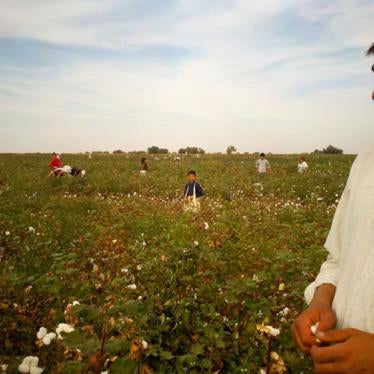At last week’s Asian Development Bank (ADB) annual meeting in Frankfurt, Germany, high level officials highlighted key human rights messages. The Bank’s president, Takehiko Nakao, emphasized the importance of free speech for sustainable development in response to concerns about the bank financing governments engaged in broad and brutal crackdowns. German Chancellor Angela Merkel, the ADB’s host, said supply chains should be free from labor abuses and welcomed the bank’s new commitment to International Labour Organization standards on supply chains. But the bank has a long way to go to turn rhetoric into reality.
Azerbaijan’s government has been waging a repressive campaign against critics, a dramatic deterioration in an already poor rights record. It has arrested or imprisoned dozens of human rights defenders, journalists, and bloggers on politically motivated charges, prompting others to flee the country or go into hiding. The government has frozen bank accounts of independent civic groups and their leaders, in some cases forcing them to shut down.
Although, since March, the authorities have pardoned or conditionally released over a dozen activists and journalists imprisoned on politically motivated charges, many others remain behind bars. The authorities have unfrozen the bank accounts of some nongovernmental groups and their leaders. But existing legislative restrictions make it effectively impossible for these groups both to use the funds in their accounts and to receive foreign funding.
In this climate, people face a risk of reprisal for commenting on development projects or exposing the misuse of funds or harmful projects. Some multilateral bodies are starting to respond. The Extractive Industries Transparency Initiative (EITI), which promotes good governance of resource-rich countries, downgraded Azerbaijan’s status last year because of its flagrant disregard for fundamental freedoms. The Open Government Partnership (OGP), which works to make governments more open, accountable, and responsive to citizens, followed suit last week.
But the ADB is looking to provide Azerbaijan with significant budget support and increase funding for a lucrative gas field with little regard for its own commitments to participation and accountability, its endorsement of EITI, and its partnership with OGP.
In Uzbekistan, the government uses forced labor in its cotton industry, but the bank continues to fund irrigation and agricultural modernization projects that support it. The government imposes strict production quotas on farmers and forces more than a million people annually to work in cotton fields. Instead of ensuring there’s no forced labor in areas benefiting from the bank’s project, the bank has only tried to prevent labor abuses in the irrigation project while ignoring forced labor in the fields they water.
Corruption is rife in both Azerbaijan and Uzbekistan. The Panama Papers have exposed evidence indicating that the family of Azerbaijan President Ilham Aliyev has extensive secret offshore accounts, with various business interests, including in gold mining. The government has wasted huge sums of hydrocarbon revenues on prestige projects that don’t produce the kind of inclusive growth the ADB’s strategy says it wants to promote. Similarly, in Uzbekistan, income from cotton sales disappears into the Selkhozfond, an opaque fund to which only the highest-level officials have access. Transparency International’s corruption perceptions index ranked Uzbekistan 153 out of 168 countries.
The ADB needs to put its money where its mouth is. In Azerbaijan, it should only provide budget support to the government once the country has stopped attacking independent voices. It also shouldn’t finance extractive industries projects until the government is again compliant with EITI. In Uzbekistan the ADB should stop funding projects that support an industry riven with forced labor. It should instead invest in projects that address the urgent social and economic needs of the people while pressing the government to end forced labor.
Jessica Evans is the senior advocate and researcher on international financial institutions at Human Rights Watch







